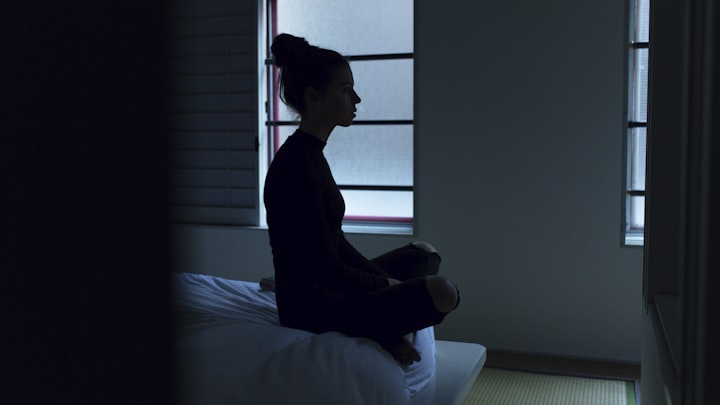Can Depression Affect Sexual Desire?
Yes, and Here's What You Can Do About It

Depression is one of the most common mental health challenges in the world, affecting up to 264 million people. It can be debilitating - causing you to feel zapped of energy, numb, and low. It's also one of the number one reasons people suffer from low libido. If you're looking for answers to the question "can depression affect sexual desire and what can I do about it?" this article has got you covered with a step-by-step section on how to proceed.
Why Depression Affects Sexual Desire
You first need to understand why depression affects sexual desire.
Often viewed as a biological need - sexual desire is actually much more complex than a basic urge. It's more like an emotion that can be affected by lots of things besides our biology.
Psychological factors like depression and anxiety, relationship factors like conflict and communication styles, and even cultural factors, like how we think we're meant to experience desire or sex - all can lead to low libido.
We cannot separate our sexuality from ourselves, which is why depression can have such a large impact on our sex drive.
Depression Is An Antithesis To Sex
Depression takes the fun out of everything. Things that used to be enjoyable; spaghetti, a cup of coffee in the morning, listening to music, or bingeing on your favourite tv series just isn't the same anymore. It leaves you feeling hollow and empty inside.
Oftentimes, depression leads you to draw away from other people, too. You cancel dinner plans and stop moving your body, and if it gets really bad - you end up isolating under your covers at home.
Add to this, difficulties sleeping, anxiety, and general feelings of numbness, and the question quickly goes from "can depression affect sexual desire" to: why wouldn't depression affect sexual desire?
Sex is all about joining together with other(s) and creating intimacy and connection. It's about experiencing pleasure, losing yourself in the moment, and feeling good about yourself.
Sex is like a mini-celebration of life, tying together both physical and mental enjoyment.
Depression wants none of this for you - and so you experience a drop in desire.
What to do about your low sexual desire
If you're currently experiencing depression and want your sex drive back, there are lots of things you can do. The solution will depend on how deep your depression is and treatment options.
Step 1) Seek treatment
Just as no one chooses a heart condition, no one chooses to have depression, either. You can, however, seek help in order to get better and feel good again, and it's important you do if you're struggling with severe depression.
Once you start to feel better, you can work on regaining your sexual desire. But until then, it's paramount to get professional help.
Common treatment for depression includes antidepressants and talk therapy such as Cognitive Behavioural Therapy or Psychodynamic Therapy. A lot of times, it's recommended to use both medication and therapy, as the combination of the two is the most effective treatment option.
Step 2) Troubleshoot medication
If you've started treatment and you're feeling depressed, but your sex drive is still nowhere to be found, the next step is to troubleshoot your medication. This is an important aspect if you're trying to answer "can depression affect sexual desire," as antidepressants are a well-known cause of low libido.
However, depression in and of itself can lead to a deserted drive for sex - why is why working out this kind of chicken or egg scenario is best left to a medical professional.
A conversation with your doctor will help you work out whether your medication may be responsible for sexual side effects such as low desire, difficulties getting sexually aroused, trouble orgasming, or a loss of a sensation in your genitals.
According to The Mayo Clinic, common antidepressants known to cause these side effects are SSRIs, SNRIs, tricyclic and tetracyclic antidepressants, and MAOIs. Because of this, your doctor might recommend adjusting the dosage of your current medication, switching medications, or adding another medication to help combat negative side effects of your current antidepressant.
Please remember: it's always important to discuss any changes in medication with your doctor first. Quitting cold turkey or adjusting the dosage on your own can lead to other negative side effects.
Step 3) Seek sex therapy or coaching
If you're not currently on medication or have been able to rule out antidepressants as the cause of your low libido, you'll want to consider other factors.
Even if the root cause of your low sex drive was initially depression - habits you acquired during your depression might be the reason it's not come back yet.
A lot of clients I see as a sex therapist and online sex coach develop a negative pattern surrounding sex that inhibits desire, even when the depression at hand is dealt with.
When low libido starts to set in, perhaps you find it difficult to talk about it with your partner. Instead of having the awkward conversation, you start to pull away so as not to "encourage" sex.
The next time your partner cozies up to you on the sofa, you disappear to the bathroom.
When your partner goes in for a kiss hello, you turn your cheek to avoid a kiss on the lips.
Every time your partner initiates closeness or intimacy, you back away for fear of having to turn them down.
By doing this, you're avoiding unpleasant feelings and difficult conversations. However, in the long-term, you're further and further away from desire and general intimacy in your relationship.
Even when your depression subsides, the gut reaction is still there - telling your mind and body that sex equals pressure, stress, and something that's bad for you. Something you just don't want (even though, deep down, you maybe still do want it).
In order to change this and increase your desire, you need to relearn what sex means to you.
Sometimes you can do this on your own, but more often than not, the kind of pattern mentioned above needs more - and this is where professional help comes in.
Seeking the help of a sex therapist or a sex coach is a great way to learn how to want sex again. The combination of our knowledge of sexual science and psychology, and the actionable tools and exercises we can offer - help you get your sex drive back.
Soon, I'll be opening the doors to a completely new way of working with me, where we'll explore how to reduce pressure and stress surrounding sex, as well as increase sex drive and intimacy. Get on the waitlist and be the first to know when the opportunity to work with me launches.
Can Depression Affect Sexual Desire? Yes - But It's Reversible
Our sexuality is a fundamental part of ourselves. It's an ingrained aspect of our person that both affects and is affected by everyday life. This is why depression not only robs you of joy all-round, but of sexual pleasure and desire, too. Because desire isn't just a drive - it's an emotion tied to our other emotions.
By treating your depression with talk therapy and antidepressants, troubleshooting medication and seeing a sex therapist or coach - you can feel that spark again. I know because I've seen it before, again and again, and it can happen for you, too.
---
Leigh Norén is a sex therapist with a Master of Science in Sexology. She helps people reduce stress, shame, & anxiety surrounding sex-so they can get their sex drive back and enjoy their partner again. If you're looking to learn more about the connection between your emotions and sex, download her free resource, A Manual for Emotions.
Originally published at Therapy by Leigh.
About the Creator
Leigh Norén
Sex therapist with a Master of Science in Sexology. Offers free online resources for a better sex life and relationship, sex therapy, and online courses.
Download free resources: https://leighnoren.com/sexual-emotional-intimacy-resources






Comments
There are no comments for this story
Be the first to respond and start the conversation.